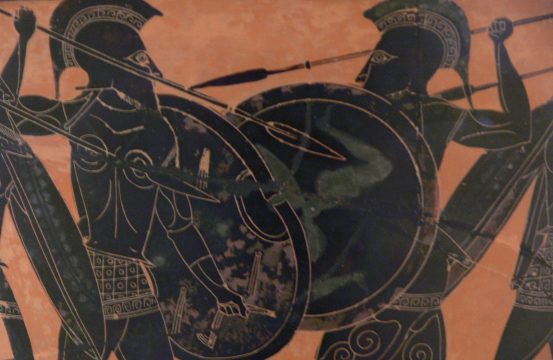[Greek] ἐκλεκτός (eklektos), [Latin] selecti: chosen, elected, chosen ones, picked out from the larger group, chosen from; Mt.22:14, Mk.13:20, Lk.18:7, Rom.8:33, Col. 3:12, 1Tim.;21, 2Tim.2:10, 1Pet.2:6,9, Rev.17:14, Lk.23:35, Mt.20:16, Lk.9:35, Jn.1:34

Thucydide, an Athenian military tactician, makes reference to elite (chosen) soldiers.
Background Information:
Secular Greek: This term predominately means choice, select, and the best quality. Thucydides, the Athenian historian and general, recounts the fifth century war between Sparta and Athens. He commented that Athens committed 300 chosen men of arms (soldiers) to attack the Syracusans. The ancient Roman constitution required that the jury (judices selecti) was to be drawn by lot in civil cases. Plato stated that election is always accompanied by some kind of obligation or task for the well-being of all members of the community.
Old Testament: This term can be used figuratively referring to the election of Israel. The general secular use refers to the quality (purity) of plants, animals, and minerals. When referring to persons, this term denotes young men and chosen fighters. The religious sense of this term can refer to God, Moses (and other prominent people), God’s people, sacred trees and bulls, and the bride Israel. The common cultic sense refers to offered sacrifices, oil of anointing, and stones (cornerstones) of the Temple. Simon sent to Antioch’s support two thousand elite troops (1Macc.15:26). Who burned the holy city and left its streets desolate (Sir. 49:6). Toward the faithful, you (God) are faithful (Psa.17:26). Take the finest spices (Ex.30:23). Here is my servant whom I uphold, my chosen one with whom I am well pleased (Isa.42:1). Moses, the chosen leader (Psa. 105:23).
New Testament: This term, essentially meaning chosen (elect), is always used in an eschatological sense in the Synoptic gospels. Throughout scripture God makes a distinction between those who are called (elected) and those who will not be called. This invitation of election implies grace, obedience, responsibility, and decision. This eschatological election replaces Israel and puts its hope in the coming of Christ. For Luke, the elect is brought in connection with suffering. For Paul, the aim of election is love. For Peter, the Gentile Christians belong to the community of the elect.
Scripture:
“Many are invited, but few are chosen.” Mt. 22:14
The parable of the wedding feast is likened to the kingdom of heaven. God invites many, but those who are elected to enter the kingdom of heaven must the wear the wedding garment of good deeds. A few will be elected to enter into heaven.
“This is My chosen Son; listen to Him.” Lk. 9:35
This is declaration of the heavenly voice of the Father. Jesus’ words must be heeded.
“The chosen one at Babylon sends you greeting, as does Mark, my son.” 1 Pet.5:13
The chosen one refers to the persecuted Christian community in Rome. Babylon is a code word for Rome.
Conclusion:
Select, eclectic
In ancient Greece it was an important cultural value to serve the state in some capacity (govt., military services, etc.) Even in these institutions, there would be those who be elite or “the best of the best.”
In the Old Testament, it would only be natural that this term would apply to God, Israel, and important people that God would inspire. It is interesting that Isa. 42:1 would have the same language as with Lk.9:35. This chosen servant may have applied to either an individual or Israel.
Then it would follow that this term would refer to Jesus. This term also infers a calling (vocation). Most notably is the example of a priest.
It is interesting to note that this term would apply to common items (food, produce, meat, grains). In today’s world, supermarkets often sell select (prime) meats and other foods. Stores also sell high end watches, furniture, electronics, and other deluxe items. Eclectic means selecting and using the best from various sources. This also reminds me of the military elite (Navy Seals, marines, other elite military services). The expression “The Few. The Proud.” comes to mind.
